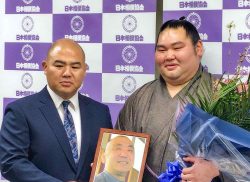12:42 JST, February 25, 2021
Shortly after the inauguration of the new U.S. administration, a pending issue between Tokyo and Washington was settled for the time being. Japan should improve its own defense capabilities and sit down with the United States to discuss ways to strengthen the alliance.
The Japanese and U.S. governments have agreed to extend for one year a special agreement that sets the current level of Japan’s share of the cost of stationing U.S. forces in Japan. The Japanese government is to shoulder a total of about ¥201.7 billion in the next fiscal year.
It is commendable that the new administration of President Joe Biden, which was inaugurated in January, worked to find a practical solution by putting an end to the excessive demands made by the administration of former President Donald Trump.
Under the Japan-U.S. Status of Forces Agreement, Japan is obligated to provide bases and compensate landowners, while the United States is to pay for other expenses related to U.S. troops in Japan.
However, against the backdrop of the U.S. trade deficit with Japan, Tokyo has shouldered the labor costs for employees working at the bases, energy and water expenses, and facility development costs since 1978, with such provisions known as the “sympathy budget.”
According to a 2004 report released by the U.S. Defense Department, Japan’s share of the cost of stationing troops stood at 75%, prominently higher than the comparable shares for Germany, South Korea and other countries. A further increase of the share is unreasonable in light of the agreement.
John Bolton, a former national security adviser in the Trump administration, revealed in his book that Washington approached Tokyo about paying $8 billion, or approximately four times the current level, in 2019 during his term in office.
If Japan significantly increases its burden, it may have to pay for the personnel expenses of U.S. soldiers and the operating costs of the U.S. military. Some experts say this could lead to undesirable results for both countries, as U.S. forces in Japan could be seen as mercenaries hired by Japan.
It is only natural that the United States did not mention such figures at the Japan-U.S. talks that began in November.
The two governments will discuss Japan’s sharing of the burden for fiscal 2022 and onward, aiming to reach an agreement by the end of this year. It is hoped that the discussions will be conducted from a broad perspective.
In recent years, the U.S. government has drastically increased its defense budget. Washington decided that in view of China’s military buildup, it was necessary to improve the capabilities of the U.S. forces.
Biden, for his part, has called China the “most serious competitor” and vowed to rebuild relations with U.S. allies. He also plans to review the strategy toward China and the preparedness of the U.S. military.
In the meantime, the president has expressed his intention to place top priority on “building back better at home.” He is likely to continue to demand greater contributions from U.S. allies, even if not to the extent that Trump did.
Under the security-related laws, which have allowed the Self-Defense Forces to protect U.S. warships and aircraft, Japan’s role in defense is expanding. It is important for the government to study what is needed to enhance the deterrent capacity of the alliance and readily take necessary actions.
— The original Japanese article appeared in The Yomiuri Shimbun on Feb. 25, 2021.
Top Articles in Editorial & Columns
-

Riku-Ryu Pair Wins Gold Medal: Their Strong Bond Leads to Major Comeback Victory
-

Reciprocal Tariffs Ruled Illegal: Judiciary Would Not Tolerate President’s High-Handed Approach
-

China Provoked Takaichi into Risky Move of Dissolving House of Representatives, But It’s a Gamble She Just Might Win
-

Japan’s Plan for Investment in U.S.: Aim for Mutual Development by Ensuring Profitability
-

Flu Cases Surging Again: Infection Can Also Be Prevented by Humidifying Indoor Spaces
JN ACCESS RANKING
-

Producer Behind Pop Group XG Arrested for Cocaine Possession
-

Japan PM Takaichi’s Cabinet Resigns en Masse
-

Man Infected with Measles Reportedly Dined at Restaurant in Tokyo Station
-

Israeli Ambassador to Japan Speaks about Japan’s Role in the Reconstruction of Gaza
-

Videos Plagiarized, Reposted with False Subtitles Claiming ‘Ryukyu Belongs to China’; Anti-China False Information Also Posted in Japan
























